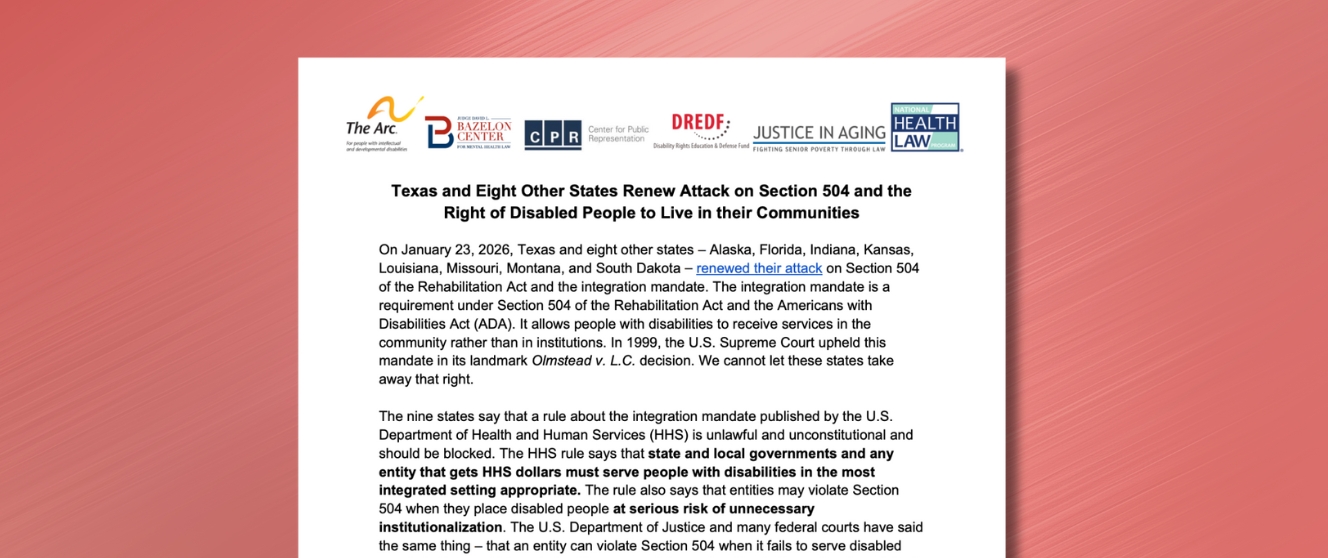
For Immediate Release — September 12, 2008
For more information, contact:
Julia Epstein, DREDF Director of Communications, (510) 644-2555 jepstein@dredf.org;
Wondie Russell, Heller Ehrman LLP, (415) 772-6294, wondie.russell@hellerehrman.com
San Francisco, California — On Thursday, September 11, 2008, Judge William Alsup of the US District Court for the Northern District of California granted class certification in a disability rights action in which plaintiffs argue that the Social Security Administration (SSA) fails to provide its communications in alternative formats that would enable people with visual impairments to have equal access to SSA programs as required by federal disability civil rights laws and the US Constitution.
The order came in a suit filed against SSA in federal court in 2005 by the American Council of the Blind and ten individuals who are blind or have visual impairments alleging that the agency fails to provide communications in alternative formats such as Braille, audio, large font or electronic text to its blind and visually impaired applicants and beneficiaries, instead communicating vital information in standard 12-point font print that they cannot read. This failure has resulted in the loss of critical subsistence benefits, privacy, and dignity.
“In the 21st century, more than 30 years after federal civil rights law made the obligation clear and technological advances make the alternatives commonplace, there is no reasonable explanation or excuse for the SSA to continue to ignore the needs and rights of blind and visually impaired individuals, and we are committed to bringing about the necessary changes to secure basic civil rights protections,” explained a lead counsel for plaintiffs, Arlene Mayerson, from the Disability Rights Education and Defense Fund. “The idea that SSA would send these critical notices in a format that these recipients of benefits cannot read is unfathomable,” says Wondie Russell from Heller Ehrman, another lead counsel for plaintiffs.
Plaintiffs in the lawsuit have gone without benefits as a result of SSA’s failure to give them effective notice of its actions. “Blind people across the country have been trying for years to get SSA to send notices in a format we can read, and we have been resoundingly ignored,” commented American Council of the Blind Executive Director Melanie Brunson. The case is scheduled for trial in April 2009. Attorneys for the plaintiffs include the Disability Rights Education and Defense Fund; Heller Ehrman LLP; the National Senior Citizens Law Center; and Disability Rights Oregon (formerly the Oregon Advocacy Center).
The American Council of the Blind is the nation’s leading consumer based advocacy organization working on behalf of blind and visually impaired Americans and has more than 70 state and specialinterest affiliates throughout the United States. The national office of the organization is located in Washington, D.C. For more information about the ACB, visit the website at www.acb.org.
Founded in 1979, by people with disabilities and parents of children with disabilities, the Disability Rights Education and Defense Fund (DREDF) is a national law and policy center dedicated to protecting and advancing the civil rights of people with disabilities through legislation, litigation, advocacy, technical assistance, and education and training of attorneys, advocates, persons with disabilities, and parents of children with disabilities. For more information, go to dredf.org.
Heller Ehrman LLP is an international law firm that has approximately 600 attorneys and professionals in 14 offices worldwide. Heller Ehrman has been ranked consistently among top law firms in the nation for its commitment to providing pro bono legal services. The firm’s core values are Excellence, People, Teamwork, Innovation, Community and One Firm. For more information, visit www.hellerehrman.com.
The National Senior Citizens Law Center advocates nationwide to promote the independence and well-being of low-income elderly individuals and persons with disabilities. NSCLC provides technical assistance and training to attorneys and other advocates and is active in litigation and policy advocacy with a strong focus on income security and health care. For more information, go to the organization’s website at www.nsclc.org.
Disability Rights Oregon (DRO) (formerly the Oregon Advocacy Center) is an independent nonprofit organization that provides legal advocacy services for people with disabilities anywhere in Oregon. DRO is designated under federal law as the protection and advocacy system for Oregon, but it is not a part of the state or federal government. DRO has attorneys and advocates who assist people with disabilities. For more information, go to www.disabilityrightsoregon.org.

